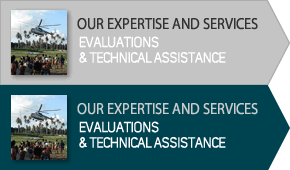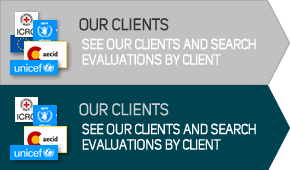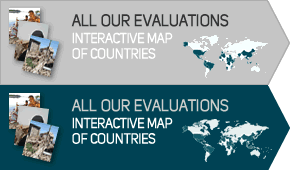“DARA has accumulated a huge knowledge base of crises around the world through the evaluations it has conducted, both at the immediate level of the individual crisis itself, and by looking systemically across the board at what has actually happened when many agencies have set out to act together to ensure the best outcomes for vulnerable people. This knowledge base, combined with the utilization focus and the multi-stakeholder approach that DARA brings is a unique and important blend. DARA is committed to improving the system, not simply delivering a report. It tries to ensure that the key stakeholders are engaged throughout the evaluation process and are therefore more able to implement emerging recommendations in a timely way.”
Juliet Pierce – Former Director of the Performance Assessment Resource Centre (DFID)
SYSTEM-WIDE EVALUATIONS
- Real-Time Evaluations
Two DARA RTEs listed among the best evaluations
UNICEF – Best Evaluations
“Inter-Agency Real Time Evaluations, including in Pakistan, the Philippines […] provided rapid feedback on coordination and operational challenges in the midst of humanitarian operations.”
OCHA – 2011 Annual Report
“This Inter-Agency Real Time Evaluation in Pakistan is the first to use a workshop as the main feedback mechanism which allows people to actively participate in the framing of recommendations, and hoping therefore they will also better implement them in order to improve the response.”
Claude Hilfiker – Former OCHA Senior Evaluation Officer; Currently, Head of Evaluation at WIPO, on the Inter-Agency Real-Time Evaluation (IA RTE) of the Humanitarian Response to the Floods in Pakistan
“This is a very important exercise that has ownership, that was discussed, that was negotiated, that was fought through and saw through by people that work here, that stay here and have to carry on.”
Manuel Bessler – Former Head of the United Nations Office for the Coordination of Humanitarian Affairs (OCHA) in Pakistan; Currently, Head of Swiss Humanitarian Aid Unit, on the Inter-Agency Real-Time Evaluation (IA RTE) of the Humanitarian Response to the Floods in Pakistan
“Its recommendations will help the humanitarian community incorporate key lessons learned into its future disaster response efforts.”
Ban Ki-moon – UN Secretary-General to the General Assembly on Pakistan, last March on the Inter-Agency Real Time Evaluation (IA RTE) of the Humanitarian Response to the Floods in Pakistan
“As we commemorate the occurrence of the floods one year ago, we acknowledge still more needs to be done. It is important to keep the momentum and to build on positives. We need to draw lessons from our work and how we can turn these into action to further improve our efforts should we be faced with similar challenges in the future. In this context, the Inter-Agency Standing Committee real time evaluation has been a valuable exercise.”
Rauf Engin Soysa – Special Envoy of the United Nations Secretary-General for Assistance to Pakistan, on the Inter-Agency Real Time Evaluation (IA RTE) of the Humanitarian Response to the Floods in Pakistan, Pakistan Floods ONE YEAR ON 2011
“The ability to improve the humanitarian system and, ultimately to respond more effectively to future humanitarian crises, will depend on our ability to learn from real time lessons, e.g. by taking immediate action on evaluations and reviews.”
John Holmes – Former Under-Secretary-General for Humanitarian Affairs and Emergency Relief Coordinator, on the Inter-Agency Real Time Evaluation of the Humanitarian response to Pakistan’s Displacement Crisis in 2009
- Ex-post Evaluations
“The report is based on an evaluation of the humanitarian response in south-central Somalia and is one of the most comprehensive evaluations of aid in Somalia ever conducted […] Implementing the recommendations will improve our efforts to alleviate the effects of famine, drought and conflict on the lives of four million people in Somalia.”
Mark Bowden – Humanitarian Coordinator for Somalia, on the Inter-Agency Standing Committee Evaluation of the Humanitarian Response in South Central Somalia 2005-2010
“The evaluation is solidly based on comprehensive research and it provides a balanced assessment of the extremely challenging humanitarian interventions in one of the most volatile protracted complex emergencies. Its recommendations are SMART and if they were implemented much would change to the better.”
Niels Dabelstein – Former Head of Evaluation of Danida, on the Inter-Agency Standing Committee Evaluation of the Humanitarian Response in South Central Somalia 2005-2010




Share this